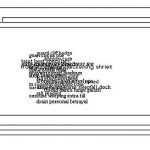2005
Elyce Helford frames Tank Girl as a portrait of the postfeminist woman: hyper-individualist and hyper-sexual - a woman who is quite comfortable in popular cinema but not so much so in reality.
2004
Diana Lobb responds to Katherine Hayles and ponders the ambiguities of dialogue.
William Major measures academic "ecocriticism" against the practical "agrarianism" of Wendell Berry.
Stephen Schryer reviews Mark Taylor and casts a critical eye on the unconditional celebration of complexity.
Diana Lobb tackles the legacy of positivism and the politics of chaotics.
For all the talk of cyber-difference, screens still behave like pages. The contributors in section six have developed, in response, a digital aesthetics unlike that of print.
John Cayley dadas up the digital, revealing similarities of type across two normally separate, unequal categories: image and text. "Neither lines nor pixels but letters," finally, unite.
Camille Utterback exposits "embodied interaction with symbolic spaces" – the body and language of digital art.
In this series of "media-element field explorations," Bill Seaman suggests configurations for the shape of the virtual artist-author to come.
The second in a series of two essays developing the parallels between Iraq and the Peloponnesian Wars, between classical Empire and postmodern Imperialism.
Andrew Stern contrasts the "drama" of Façade against cognitive realism.
The parallels (and oppositions) between hypertext and AI are brought out in section five.
Mark Bernstein and Diane Greco address "the utility question."
Eastgate Systems alumns Diane Greco and Mark Bernstein explain two "exotic tools for hypertext narrative."
Ken Perlin finds hypertext templates useful as they are used, not in tool form.
Camille Utterback figures the mouse click as weakly interactive.
Techno-poet Stephanie Strickland surveys the digital artistic practices of her peers and presents a "paradigm for interaction."
Stephanie Strickland makes marks an intervention across the "I."


